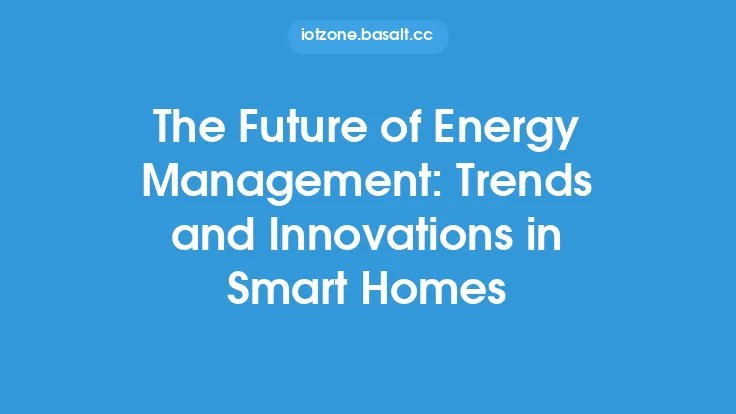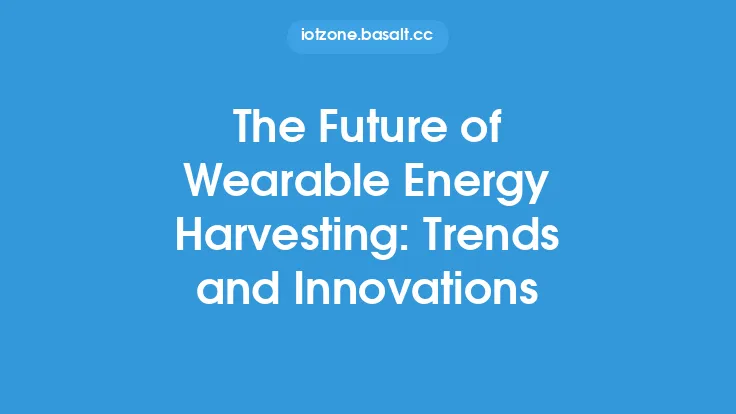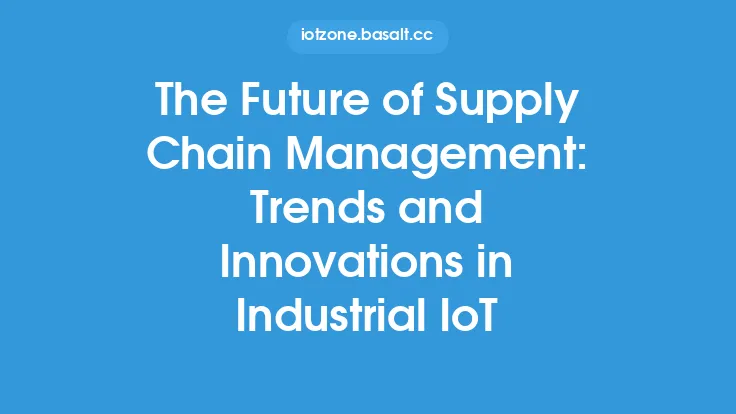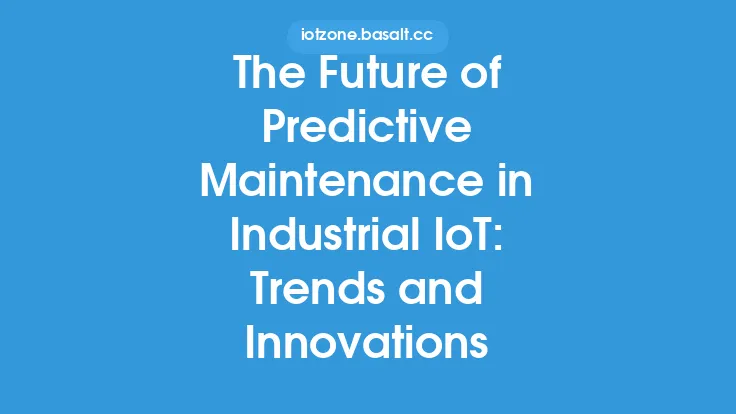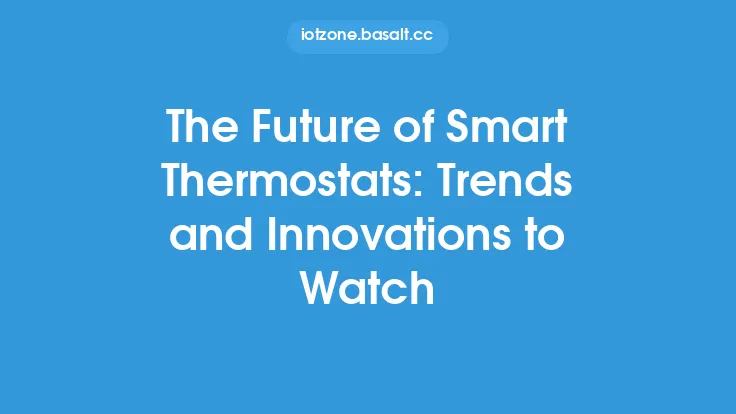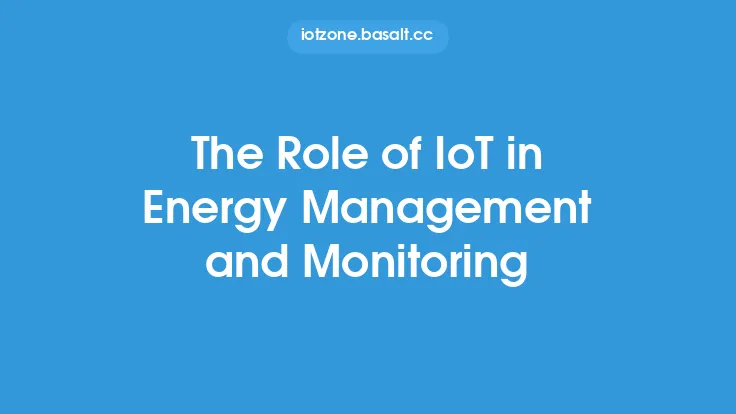The world of energy management is undergoing a significant transformation, driven by the increasing adoption of Internet of Things (IoT) technologies. As the demand for energy continues to rise, the need for efficient, reliable, and sustainable energy management systems has become more pressing than ever. IoT is playing a vital role in this transformation, enabling the creation of intelligent energy management systems that can optimize energy consumption, reduce waste, and promote sustainability. In this article, we will explore the trends and innovations in IoT that are shaping the future of energy management.
Introduction to IoT in Energy Management
IoT in energy management refers to the use of IoT devices, sensors, and communication protocols to monitor, control, and optimize energy consumption in various settings, including industrial, commercial, and residential. The integration of IoT in energy management enables real-time monitoring of energy usage, allowing for prompt identification of areas of inefficiency and opportunities for improvement. IoT devices can be used to track energy consumption patterns, detect anomalies, and predict energy demand, enabling more accurate forecasting and planning.
Key Trends in IoT-based Energy Management
Several trends are driving the adoption of IoT in energy management, including the increasing use of smart devices, the growth of the industrial internet, and the rising demand for energy efficiency. Some of the key trends in IoT-based energy management include:
- The use of advanced analytics and machine learning algorithms to optimize energy consumption and predict energy demand
- The integration of IoT with other technologies, such as artificial intelligence (AI) and blockchain, to create more secure and efficient energy management systems
- The growing adoption of IoT-based energy management systems in industrial and commercial settings, where energy consumption is typically high
- The increasing use of IoT devices, such as smart meters and sensors, to monitor energy consumption in real-time
Innovations in IoT-based Energy Management
Several innovations are driving the development of IoT-based energy management systems, including the use of advanced sensors, communication protocols, and data analytics platforms. Some of the key innovations in IoT-based energy management include:
- The development of advanced sensors that can monitor energy consumption in real-time, such as smart meters and power quality sensors
- The use of communication protocols, such as Zigbee and Bluetooth Low Energy (BLE), to enable secure and efficient communication between IoT devices
- The development of data analytics platforms that can process large amounts of energy consumption data, such as cloud-based platforms and edge computing devices
- The integration of IoT with other technologies, such as building management systems (BMS) and supervisory control and data acquisition (SCADA) systems, to create more comprehensive energy management systems
Technical Requirements for IoT-based Energy Management
The development of IoT-based energy management systems requires a range of technical capabilities, including advanced sensors, communication protocols, and data analytics platforms. Some of the key technical requirements for IoT-based energy management include:
- The use of advanced sensors that can monitor energy consumption in real-time, such as smart meters and power quality sensors
- The development of communication protocols that can enable secure and efficient communication between IoT devices, such as Zigbee and BLE
- The use of data analytics platforms that can process large amounts of energy consumption data, such as cloud-based platforms and edge computing devices
- The integration of IoT with other technologies, such as BMS and SCADA systems, to create more comprehensive energy management systems
Benefits of IoT-based Energy Management
The adoption of IoT-based energy management systems can bring a range of benefits, including improved energy efficiency, reduced energy waste, and increased sustainability. Some of the key benefits of IoT-based energy management include:
- Improved energy efficiency: IoT-based energy management systems can optimize energy consumption, reducing waste and improving overall energy efficiency
- Reduced energy costs: IoT-based energy management systems can help reduce energy costs by identifying areas of inefficiency and optimizing energy consumption
- Increased sustainability: IoT-based energy management systems can promote sustainability by reducing energy consumption and promoting the use of renewable energy sources
- Enhanced reliability: IoT-based energy management systems can improve the reliability of energy supply, reducing the risk of power outages and other disruptions
Challenges and Limitations of IoT-based Energy Management
While IoT-based energy management systems offer a range of benefits, there are also several challenges and limitations that must be addressed. Some of the key challenges and limitations of IoT-based energy management include:
- Security risks: IoT-based energy management systems can be vulnerable to cyber attacks, which can compromise the security of energy supply
- Interoperability issues: IoT-based energy management systems can be prone to interoperability issues, which can make it difficult to integrate different devices and systems
- Data management: IoT-based energy management systems can generate large amounts of data, which can be difficult to manage and analyze
- Cost: IoT-based energy management systems can be expensive to implement and maintain, which can be a barrier to adoption for some organizations.
Conclusion
In conclusion, the future of energy management is being shaped by the increasing adoption of IoT technologies. IoT-based energy management systems offer a range of benefits, including improved energy efficiency, reduced energy waste, and increased sustainability. However, there are also several challenges and limitations that must be addressed, including security risks, interoperability issues, data management, and cost. As the demand for energy continues to rise, the need for efficient, reliable, and sustainable energy management systems will become more pressing than ever. IoT is playing a vital role in this transformation, enabling the creation of intelligent energy management systems that can optimize energy consumption, reduce waste, and promote sustainability.
